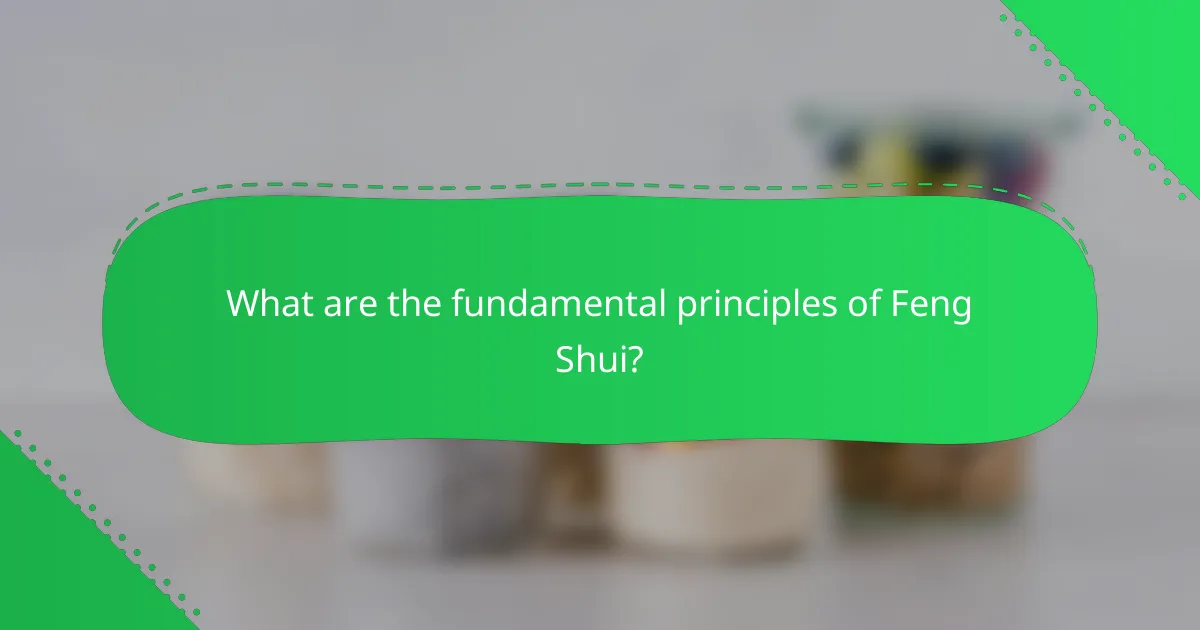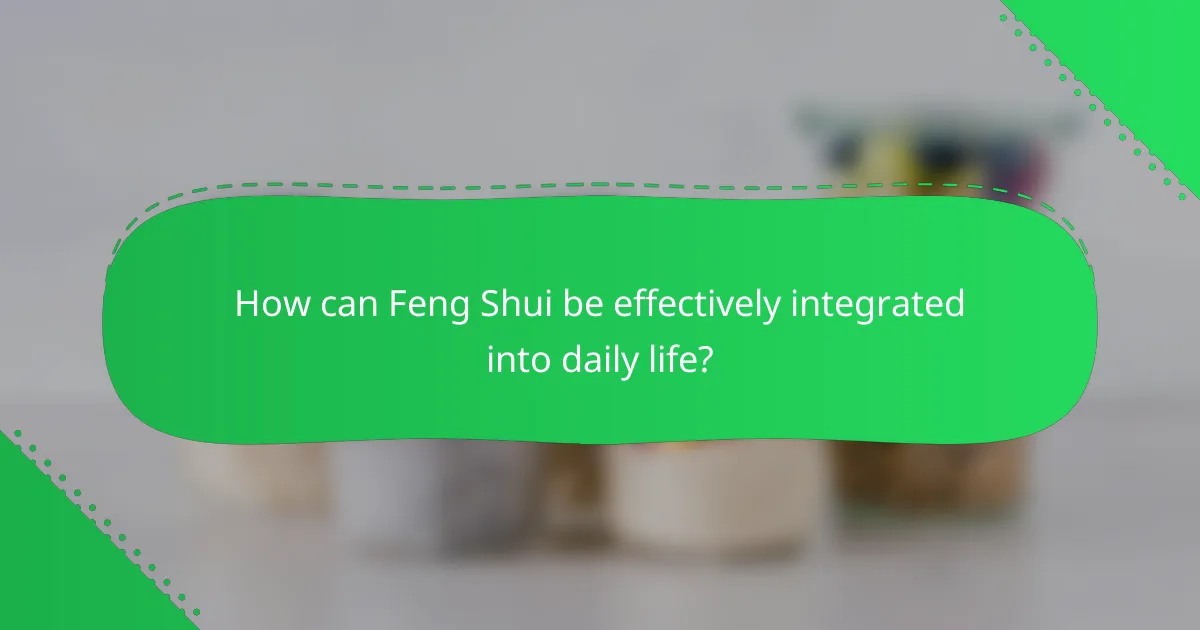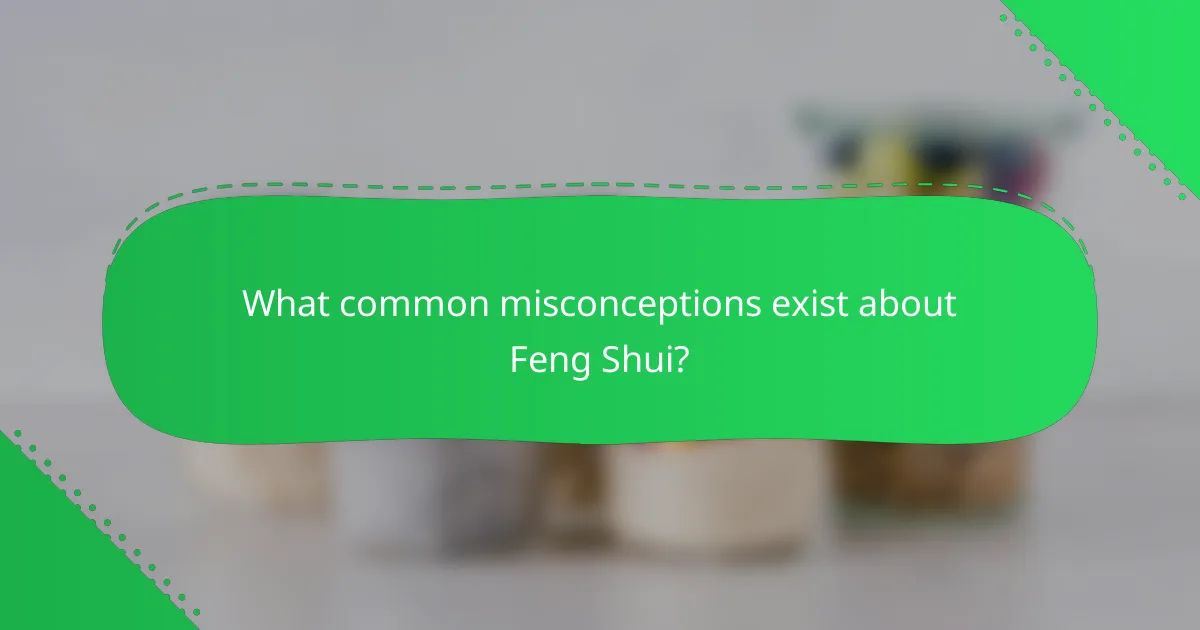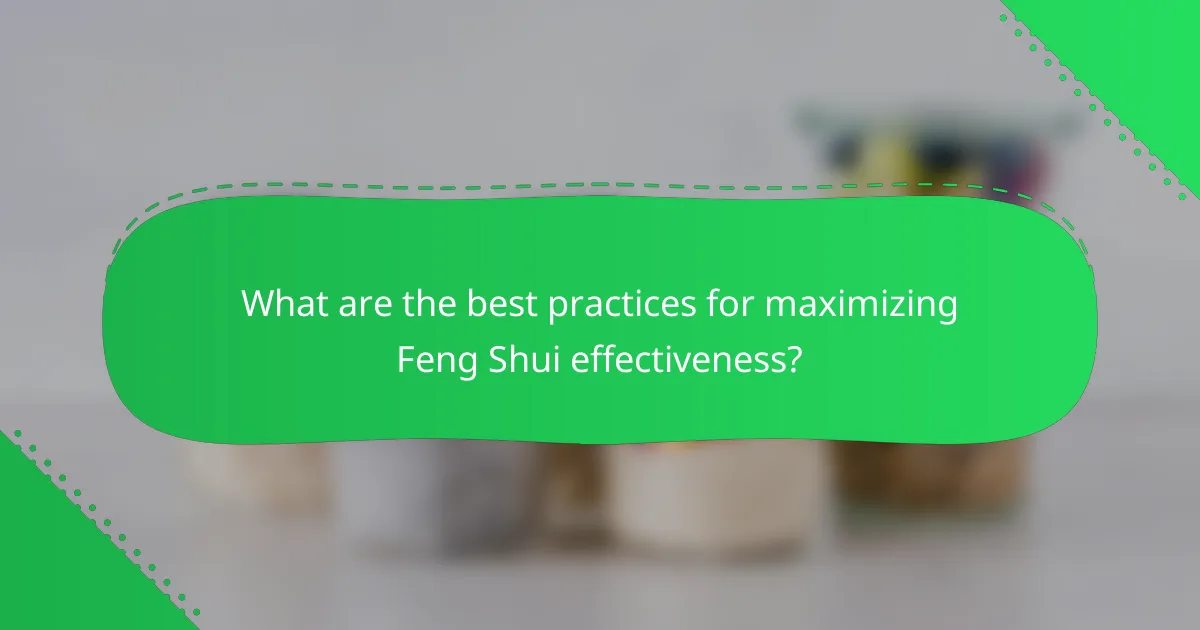Feng Shui enhances well-being, harmony, and productivity in daily life. This article explores its fundamental principles, benefits, practical applications, cultural variations, and rare techniques. Understanding these elements can transform your living spaces and promote a supportive environment for health and prosperity.

What are the fundamental principles of Feng Shui?
The fundamental principles of Feng Shui focus on harmonizing energy within spaces. Key principles include the flow of Chi, the balance of Yin and Yang, and the significance of the five elements: wood, fire, earth, metal, and water. These elements interact to create balance and promote well-being. Additionally, the arrangement of furniture and objects is crucial to enhance positive energy and minimize negative influences. Understanding these principles allows for practical application in daily life, fostering a supportive environment for health and prosperity.
How does Qi influence Feng Shui?
Qi influences Feng Shui by determining the flow of energy in a space, impacting harmony and balance. Good Qi enhances well-being, while blocked Qi can lead to stagnation and discomfort. Feng Shui principles aim to optimize Qi through spatial arrangement, color, and material selection. This ensures environments promote positive energy flow, leading to improved health, relationships, and prosperity.
What role do the Five Elements play in Feng Shui?
The Five Elements in Feng Shui—Wood, Fire, Earth, Metal, and Water—are fundamental to creating balance and harmony in environments. Each element represents unique attributes that influence energy flow. For example, Wood symbolizes growth and vitality, while Water represents fluidity and adaptability. Understanding these elements enhances spatial arrangement and personal well-being. The interplay among elements can either nurture or control one another, impacting overall energy dynamics. By applying these principles, individuals can optimize their surroundings for improved health and prosperity.
Why is the Bagua map essential in Feng Shui practice?
The Bagua map is essential in Feng Shui practice as it provides a framework for analyzing and enhancing energy flow in a space. It identifies areas corresponding to different aspects of life, such as wealth, health, and relationships. By overlaying the Bagua map onto a floor plan, practitioners can pinpoint areas needing improvement and apply specific Feng Shui remedies. This targeted approach facilitates a harmonious environment that supports personal and spiritual growth. The Bagua map’s unique attribute lies in its ability to connect physical space with life areas, making it a powerful tool in Feng Shui applications.

What benefits can one expect from applying Feng Shui?
Applying Feng Shui can lead to improved well-being, harmony, and productivity. It enhances energy flow in living spaces, promoting relaxation and reducing stress. Implementing these principles can result in better relationships, increased prosperity, and overall life satisfaction. Feng Shui also encourages mindful organization, which can lead to a more focused mindset and clearer decision-making.
How can Feng Shui enhance personal well-being?
Feng Shui enhances personal well-being by creating harmonious environments that promote positive energy flow. This practice aligns surroundings with individual needs, improving mental clarity and emotional stability.
Key benefits include increased relaxation, enhanced relationships, and better health. For example, arranging furniture to allow for natural light can elevate mood and productivity.
Applying Feng Shui principles daily can involve simple changes like decluttering spaces and incorporating natural elements. These adjustments make environments more inviting and supportive of personal growth.
Ultimately, the unique attribute of Feng Shui lies in its ability to tailor spaces to individual preferences, fostering a sense of peace and balance in daily life.
In what ways does Feng Shui improve relationships?
Feng Shui improves relationships by creating harmonious environments that foster connection and communication. By arranging spaces to enhance energy flow, individuals experience increased intimacy and understanding. Key aspects include the placement of furniture to promote open dialogue and the use of colors that evoke warmth and affection. Additionally, incorporating symbols of love, such as pairs of objects, can strengthen bonds. Overall, applying Feng Shui principles cultivates a supportive atmosphere for nurturing relationships.
What impact does Feng Shui have on financial prosperity?
Feng Shui can positively influence financial prosperity by optimizing energy flow in spaces. Proper placement of objects and colors can attract wealth and abundance. For example, incorporating elements like water features or plants in specific areas enhances financial opportunities. Additionally, maintaining clutter-free environments supports a clear mindset for financial success.

How can Feng Shui be effectively integrated into daily life?
Feng Shui can be effectively integrated into daily life by creating harmonious environments that enhance well-being. Start by decluttering spaces to promote energy flow. Incorporate natural elements like plants for vitality. Use colors strategically to evoke desired emotions. Position furniture to encourage interaction and movement. Regularly assess your surroundings to maintain balance and alignment with personal goals.
What are simple Feng Shui adjustments for home environments?
Simple Feng Shui adjustments can enhance the flow of positive energy in home environments. Rearranging furniture to allow for open pathways promotes harmony. Adding plants introduces vitality and purifies air. Utilizing mirrors strategically can expand spaces and reflect light. Decluttering creates a serene atmosphere, reducing stress. Incorporating calming colors fosters relaxation and balance.
How can workspace Feng Shui boost productivity?
Workspace Feng Shui can significantly boost productivity by creating a harmonious environment. It promotes positive energy flow, reduces distractions, and enhances focus. Key principles include decluttering, optimal furniture placement, and incorporating natural elements. These adjustments lead to improved mood and efficiency, fostering a more productive work atmosphere.
Which Feng Shui practices are suitable for outdoor spaces?
Feng Shui practices suitable for outdoor spaces include proper placement of plants, water features, and seating areas. These elements enhance energy flow and promote harmony.
1. **Plant Selection**: Choose vibrant, healthy plants to attract positive energy.
2. **Water Features**: Incorporate fountains or ponds to symbolize abundance and tranquility.
3. **Seating Arrangement**: Position seating to face the entrance, fostering a welcoming atmosphere.
4. **Pathways**: Design winding paths to encourage leisurely movement and discovery.
5. **Lighting**: Use soft lighting to create a calming ambiance during evening hours.

What common misconceptions exist about Feng Shui?
Many misconceptions about Feng Shui include the belief that it is merely about furniture placement or that it guarantees wealth. Feng Shui is a holistic practice that emphasizes energy flow and balance in environments. It is not a quick fix but a long-term approach to creating harmony. Additionally, some think it conflicts with other beliefs, while it can coexist with various philosophies and religions.
Why do some people think Feng Shui is just superstition?
Some people view Feng Shui as superstition due to its roots in ancient beliefs and practices that lack empirical evidence. Critics often associate it with magical thinking rather than practical application. Additionally, the complexity of its principles can lead to misunderstandings, causing skepticism among those unfamiliar with its benefits. As a result, many dismiss it without exploring its potential advantages in enhancing well-being and harmony in daily life.
How is Feng Shui misunderstood in different cultures?
Feng Shui is often misunderstood across cultures due to varying interpretations and practices. In Western cultures, it is frequently viewed merely as home decoration rather than a holistic practice. This perspective neglects the deeper philosophical and energetic principles that underpin Feng Shui. In contrast, Chinese culture emphasizes its spiritual and historical significance, integrating it into daily life and architecture. Misinterpretations can lead to superficial applications, missing the core benefits of harmony and balance that Feng Shui aims to achieve. As a result, the unique attributes of Feng Shui may be lost, leading to ineffective implementations in various cultural contexts.

What unique Feng Shui practices are found in different cultures?
Feng Shui practices vary across cultures, each incorporating unique elements. In Chinese culture, Feng Shui emphasizes the flow of Chi and the arrangement of space to enhance harmony. In Tibetan culture, it integrates spiritual elements, focusing on sacred geometry and energy fields. Japanese Feng Shui, or “Kanso,” prioritizes simplicity and minimalism, promoting tranquility. Western adaptations often blend Feng Shui with modern design principles, emphasizing aesthetics alongside energy flow. Each culture’s unique practices enrich the overall understanding and application of Feng Shui in daily life.
How does Japanese Feng Shui differ from Chinese practices?
Japanese Feng Shui emphasizes harmony with nature and spiritual elements, while Chinese practices focus on energy flow and balance. Japanese methods often incorporate Shinto beliefs, resulting in unique rituals and aesthetic principles. In contrast, Chinese Feng Shui uses a systematic approach with detailed calculations and the use of the Bagua map. Both traditions aim to enhance well-being but differ in their cultural contexts and applications.
What are the distinctive features of Western Feng Shui?
Western Feng Shui emphasizes harmony with the environment through distinct features. Key aspects include the use of color to influence mood, the arrangement of furniture for optimal energy flow, and the incorporation of natural elements to create balance. Additionally, Western Feng Shui often adapts traditional Chinese principles to suit modern living spaces, focusing on practicality and aesthetic appeal. This approach prioritizes personal well-being and comfort, making it accessible for everyday application.

What rare Feng Shui techniques can enhance your practice?
Rare Feng Shui techniques include the use of specific crystals, sound therapy, and unique color applications to enhance energy flow. These methods can significantly improve your practice by attracting positive energy and creating balance in your environment. For example, using amethyst crystals can promote tranquility, while sound therapy can clear stagnant energy. Additionally, applying colors based on the Bagua map can target specific life areas, enhancing overall well-being.
How can advanced Feng Shui concepts be applied in urban settings?
Advanced Feng Shui concepts can enhance urban living by optimizing space, energy flow, and harmony. Urban settings often face challenges like noise and clutter, which can disrupt balance. Implementing Feng Shui principles such as strategic placement of furniture, use of natural elements, and color schemes can create a serene environment.
For example, incorporating plants can improve air quality and enhance positive energy. Additionally, using mirrors strategically can expand space perception and reflect light, promoting a brighter atmosphere. These applications foster well-being and productivity in densely populated areas, making urban living more enjoyable.
Ultimately, applying advanced Feng Shui in urban settings aligns spaces with their inhabitants’ needs, creating a harmonious balance amid the hustle and bustle of city life.
What are the unique tools used by Feng Shui masters?
Feng Shui masters utilize unique tools such as the compass, called a Luopan, to determine auspicious directions. They also employ crystals for energy enhancement, Bagua maps for spatial analysis, and various symbols to attract positive energy. Each tool serves specific purposes in aligning environments with natural energies.

What are the best practices for maximizing Feng Shui effectiveness?
To maximize Feng Shui effectiveness, focus on decluttering, balancing elements, and enhancing energy flow. Prioritize room layout, utilize natural light, and incorporate plants for vitality. Regularly assess and adjust your space to align with changing needs and energies.
What common mistakes should be avoided in Feng Shui application?
Common mistakes in Feng Shui application include neglecting the energy flow, overcrowding spaces, and ignoring the importance of decluttering. Failing to consider the five elements can also lead to unbalanced energy. Additionally, placing mirrors incorrectly can disrupt harmony. Understanding these pitfalls enhances effective Feng Shui practice.
How can one continuously optimize their Feng Shui environment?
Continuously optimizing a Feng Shui environment involves regular assessment and adjustment of spatial arrangements and elements. Focus on decluttering spaces to enhance energy flow. Incorporate natural elements like plants and water features to promote harmony. Regularly update colors and decor to reflect seasonal changes, aligning with the energy of each period. Assess the placement of furniture to ensure it supports positive energy circulation. Engage in mindful practices such as meditation to maintain a balanced atmosphere.
